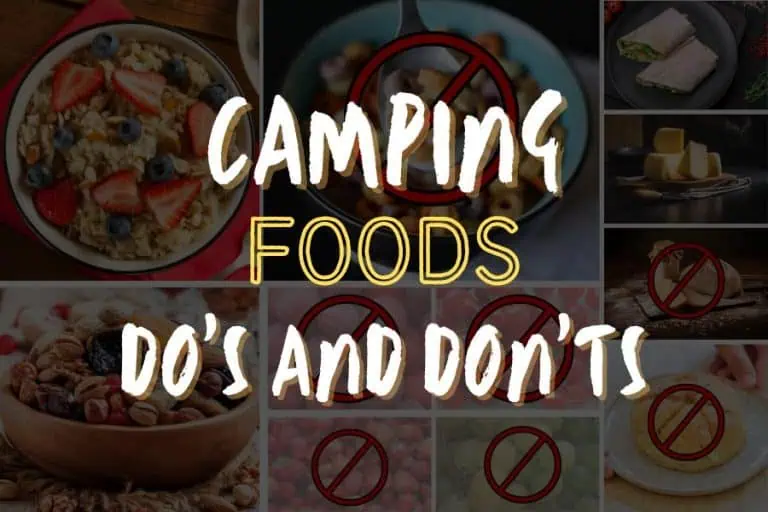Every outdoor excursion needs a fantastic meal to look forward to!
Whether you’re planning a camping trip, or need to pack light for a longer backpacking trek, there are a few reliable best and worst camping foods to keep in mind.
Check out our list below of the best camping food do’s and don’ts for your next trip!
Best Camping Foods – Breakfast
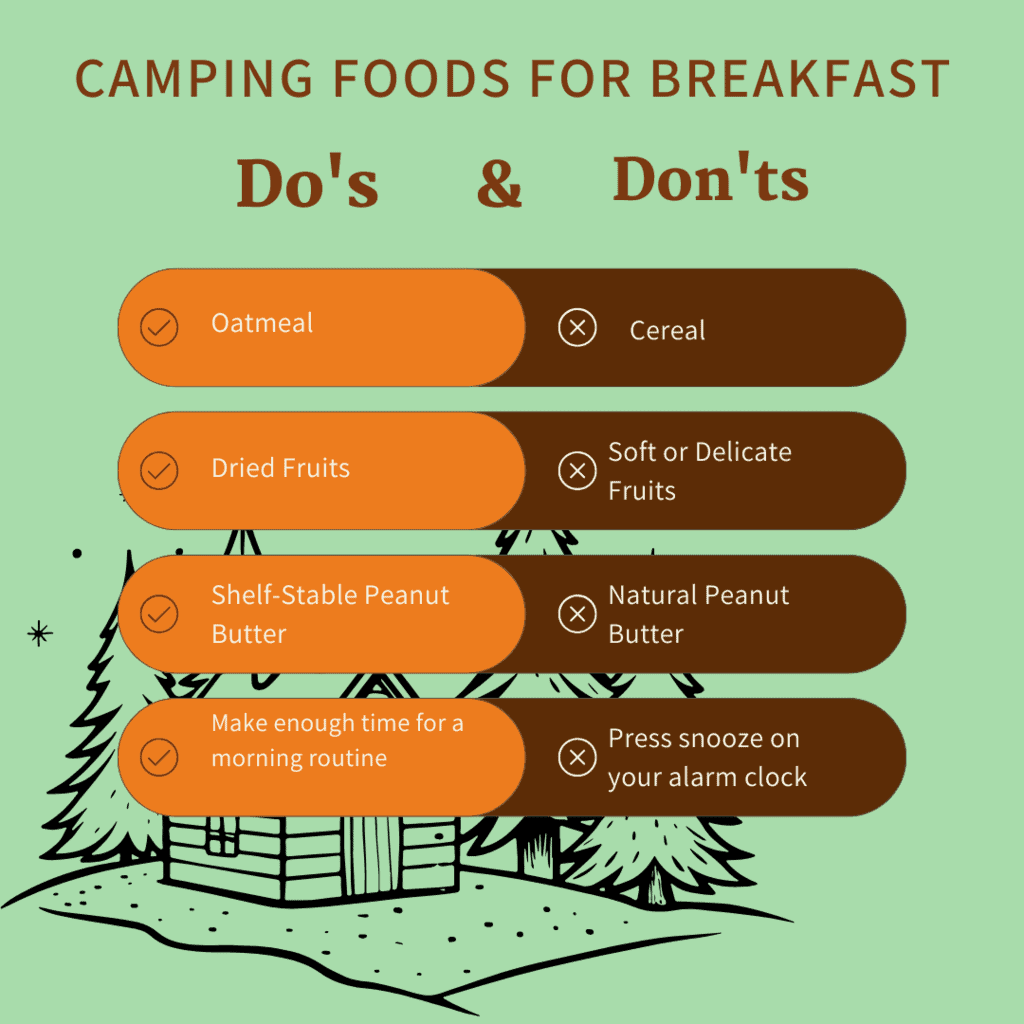
Breakfast is the most important meal of the day—even when you’re camping.
A well-planned camping breakfast can set the tone for your entire outdoor adventure, keeping you energized and satisfied.
But not all breakfast choices are camp-friendly. Here are our recommended do’s and don’ts for camp breakfast:

Do: Oatmeal
It’s old and reliable! Lightweight, single-serve packets of oatmeal are a great addition to any camping menu.
Fill each packet with water to the fill line, stir, and let it sit, and you’ve got a great breakfast that will fuel you for any outdoor excursion.
Even better, grab a few packs with special flavors (brown sugar is our fav), and it’ll feel like a special morning treat.
Don’t: Cereal
We all have our favorite cereal, but bringing your favorite box on the trail can be a bad idea.
Cereal boxes take up a lot of space while providing relatively little nutrition for their bulk.
Not to mention, loose cereal can easily get crushed in your pack, turning into a pile of crumbs before you even get the chance to eat it.
Milk is also hard to come by in the wilderness, so it’s more than likely you’ll be eating those cereal crumbs dry.

Do: Dried Fruits
Since fresh fruit can get bruised and suffer from lack of refrigeration, dried fruits are a great option for adding some nutrients and flavor to your camping breakfast.
We also love dried fruits for the energy they give us. They are packed with sugars that can fuel you and give you energy on longer hikes.
Raisins, dried apricots, and dried mango are some of our favorites.
Don’t: Soft or Delicate Fruits
Delicate fruits like bananas, peaches, or berries on a backpacking trip can bruise and spoil easily, making them messy and unappetizing after just a short time in your pack.
The jostling movement of hiking, combined with the weight of other gear, can quickly turn these fruits into mush, potentially leaking juice onto your other supplies
Do: Shelf-Stable Peanut Butter
Filled with protein and healthy fats, shelf-stable peanut butter can pack a great nutritional punch on your camping adventure.
We’ve put it in the breakfast category because we think it’s great in oatmeal, but peanut butter can also be a great addition to sandwiches at lunch, smores after dinner, and can even be great by the spoonful for an afternoon snack.
Don’t like peanut butter? Any other nut butter will get you similar benefits. Try out almond butter, cashew butter, or sun butter.
Don’t: Natural Peanut Butter
Bringing natural peanut butter on a backpacking trip is a “don’t” because of its oily separation and need for stirring, which can be messy and inconvenient on the trail.
Those natural oils can leak inside your pack if the lid isn’t sealed tightly, creating a greasy mess that’s difficult to clean up.
Additionally, natural peanut butter is often sold in heavy glass or bulky plastic jars, adding unnecessary weight to your load.
Best Camping Foods – Lunch
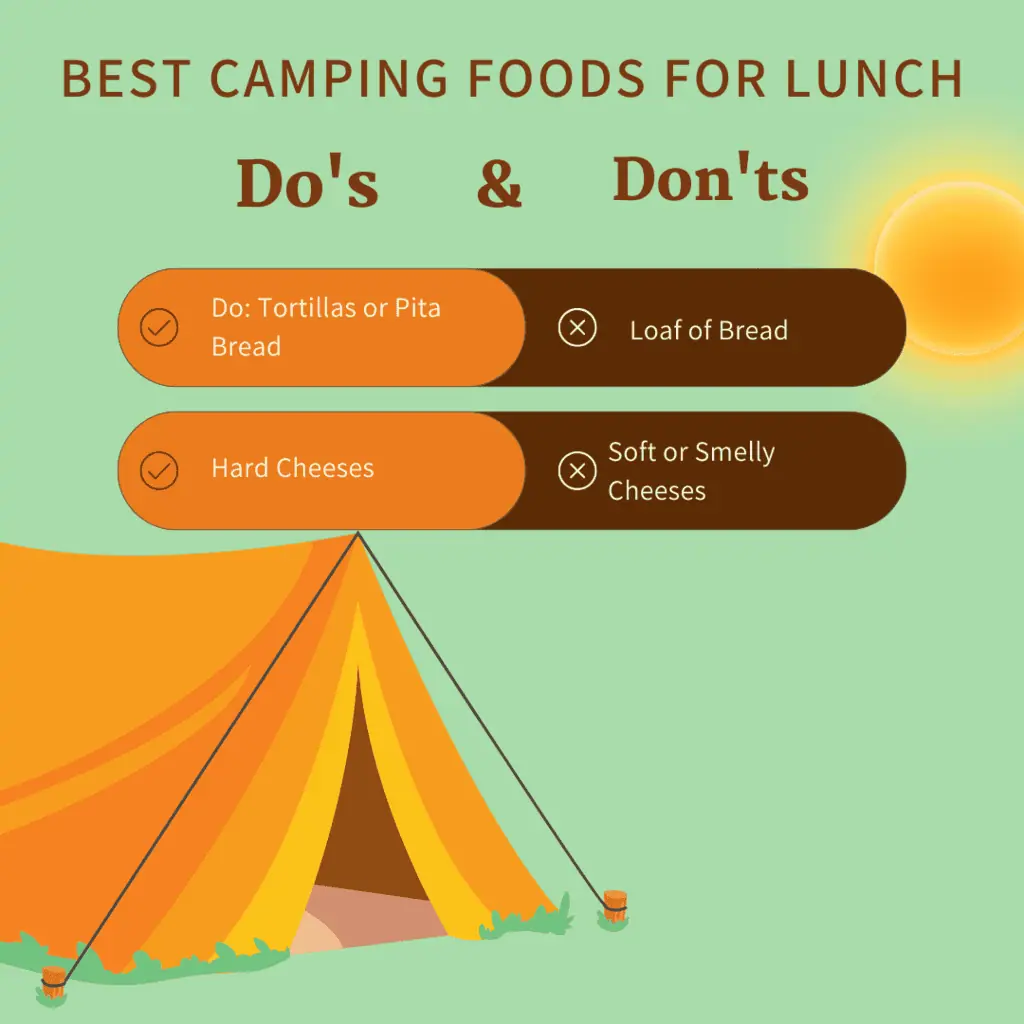
Lunch while camping should be quick, easy, and packed with energy to keep you going through the day’s adventures.
Unlike breakfast and dinner, lunch is often best kept light and simple, avoiding anything that requires too much prep or cleanup:
Do: Tortillas or Pita Bread
Everything is better wrapped in bread! If you have sandwiches in mind for your camping adventure, we recommend you bring a pack of tortillas or pita pockets instead of a loaf of bread.
As flatter alternatives, tortillas or pitas take up much less space, and are much more durable.
This way, you’ll always have a dependable source of starch that won’t get messed up when it’s packed in with the rest of your camping gear.
Don’t: Loaf of Bread
We don’t recommend packing a loaf of bread with you on the trail because it takes up a lot of space and can easily get squished in your pack.
No one wants their bread to get flattened under heavy gear, leaving you with flattened, unappetizing slices.
Not only that, but bread loafs tend to dry out or become stale quickly, especially in varying outdoor conditions.
Do: Hard Cheeses
Hard cheeses like gouda or cheddar last much longer than their softer alternatives, and are much safer to pack for a longer period of time. You can add them to your afternoon sandwiches for a quick, tasty bite on the trail.
Have more time on your hands? Pull out the stove and melt the cheese in a tortilla for a classic quesadilla meal.
There’s nothing like melty cheese to motivate you for the rest of your trek!
Don’t: Soft or Smelly Cheeses
You might want to be one with nature, but you won’t necessarily want to attract any curious creatures to your campsite.
Make sure to avoid any especially soft or smelly cheeses, which can easily make a mess and smell up a campsite.
While all the food you bring with you on the trail should be properly stored at night, the most fragrant foods can make it even more challenging to keep the rest of your materials away from hungry stomachs.
Best Camping Foods – Snacks
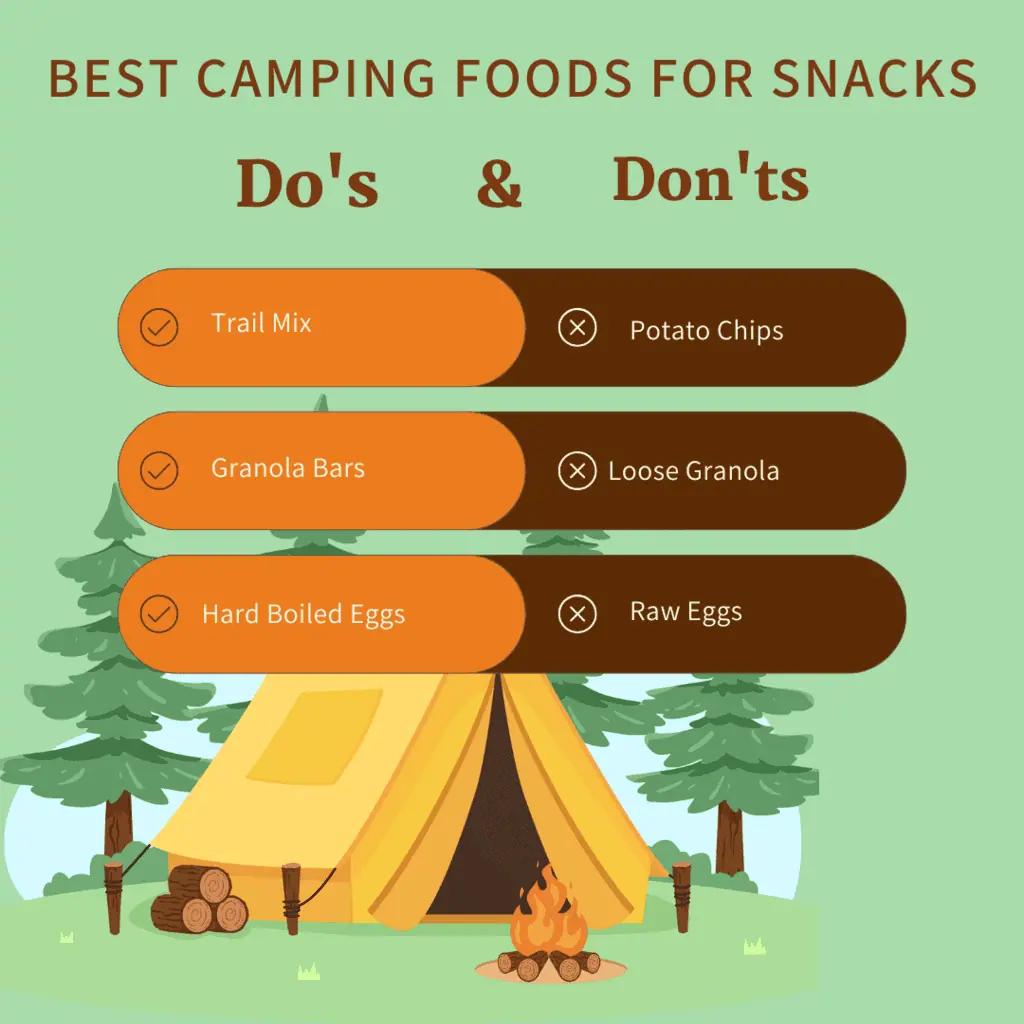
Snacks can make or break your camping experience.
The right ones will keep your energy up between meals, while the wrong ones can leave you feeling sluggish or dealing with a melted, crumbled mess:
Do: Trail Mix
There’s almost nothing better than a big bag of trail mix after a long afternoon on the trail.
You can buy something pre-made or make your own mix.
Classic ingredients for trail mix include nuts, dried fruit, granola, chocolate – and anything else you can think of! You can even invite your camping crew over to make their own custom mix for your outdoor excursion.
Don’t: Potato Chips
The most important thing about backpacking snacks is, well, that they don’t fall apart before you get to eat them.
That’s why we recommend you skip bringing potato chips with you on your next trek.
Getting packed in with the rest of your gear is a great way for chips to get crushed.
Not only that, but potato chips won’t give you the long-lasting energy that you need on longer hikes.
Do: Granola Bars
Granola bars are lightweight (and you can buy them in bulk!), making them a great snack to have on hand when you’re camping.
Whether you want protein-packed bars (we love Nature Valley Protein Bars) or crunchy nut bars, there’s an option for everyone to enjoy.
Slip one into your pocket for a day hike, or throw a few into your pack for a longer trek and you’ll always have a snack ready to go.
Don’t: Loose Granola
Bringing loose granola on a backpacking trip can be more trouble than it’s worth.
Without proper packaging, it can easily spill inside your pack, creating a mess that’s difficult to clean up and potentially attracting unwanted wildlife.
Additionally, scooping handfuls of granola while hiking can be inconvenient, leading to wasted crumbs and sticky hands if mixed with ingredients like honey or dried fruit.
Do: Hard Boiled Eggs
Hard Boiled eggs are an excellent addition to a backpacking trip because they are nutrient-dense, lightweight, and easy to pack.
They provide a great source of protein and healthy fats, helping to keep you full and energized on the trail.
Just pack them in a container or wrap in a paper towel, and they’re the perfect grab and go snack for your crew.
Plus, they can be eaten on their own or added to other camping meals for a boost of nutrition, making them a versatile and practical food choice for any backpacker.
Don’t: Raw Eggs
Trust us, the last thing you want is egg yolk in your hiking socks.
Raw eggs can be one of the worst ingredients to bring on the trail because they are so fragile.
Packing your bag can get rough, and most eggs will crack under the pressure and make a huge mess.
Raw eggs also rely on refrigeration to stay suitable for eating.
If you insist on eating eggs every day, look for dried egg powder.
The canned, shelf-stable alternative packs the same nutritional punch without needing a consistently cool environment.
Best Camping Foods – Dinner
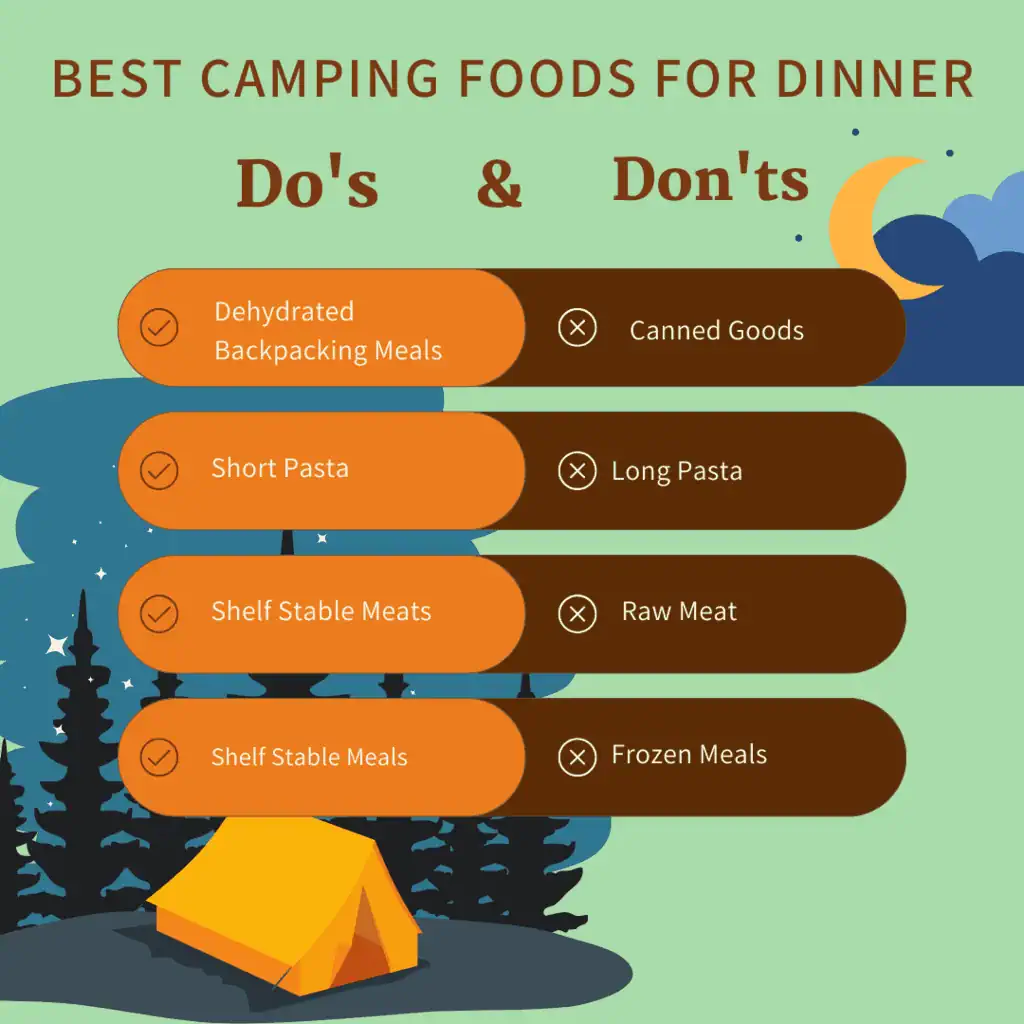
Dinner is often the most satisfying meal of a camping trip, but it can also be the trickiest to prepare.
After a long day of hiking, exploring, or just relaxing, you want something hearty and delicious without spending hours cooking or dealing with a complicated cleanup:
Do: Dehydrated Backpacking Meals
Backpacking meals have come a long way!
If you take a gander at the meal aisle in your local outdoors store, you’ll find dehydrated and freeze-dried meals for camping like Buffalo Ranch Chicken, Pad Thai, or Hatch Mac and Cheese.
These camping meals are industrially dehydrated to be light as a feather.
When you get to your campsite, all you’ll need to do is boil water, add to the bag, and let it sit.
Once you’re done, you’ll have a delicious and nutritious meal to close out your day.
We especially like the dehydrated camping food coming out of Mountain House and Backpacker’s Pantry.
Check them out for your next trip.
Don’t: Canned Goods
We will never recommend that you bring a whole bunch of cans on the trail with you.
Their weight and bulk can really weigh you down, not to mention take up valuable space in your pack.
Once opened, all cans must be properly disposed of or packed out, which can only be messy and inconvenient.
Finally, most cans will require a can opener, which can add yet another item to your gear (and weight to your pack).
Do: Short Pasta
If you don’t want to go as fancy as a prepackaged dehydrated meal, there’s a lot of other great options.
One of our favorite lightweight options is pasta!
Pack your favorite short pasta shape in your bag to make a great pasta dinner out on the trail.
Add your favorite sauce (we recommend anything in a plastic jar to avoid the potential for broken glass), and shred some cheese on top, and you’ll be good to go.
Don’t: Long Pasta
Bringing long pasta like spaghetti on a backpacking trip can be impractical and cumbersome.
Its rigid shape makes it difficult to pack efficiently, as it can easily snap into uneven pieces or poke through bags.
Not only that, but cooking it on the trail can also be a hassle, requiring a larger pot and more water than other pasta options.
Skip the spaghetti dinner, and opt for a shorter pasta shape instead.
Do: Shelf Stable Meats
Shelf-stable proteins, like tuna, spam, or summer sausage, can be incredible sources of protein on the trial.
Even better, you won’t risk getting an upset stomach from any of these options.
Many dehydrated backpacking meals will also have safe to eat meal components in them, so be sure to pick some protein packed versions!
Don’t: Raw Meat
It can be tempting to grill a delicious set of ribs out under the stars, but we recommend you skip it.
Without a reliable refrigeration method, raw meats of all kinds can get dicey on the trail, leading to upset stomachs and food poisoning.
Leave the brisket, ribs, and large cuts of protein for your next car camping trip or cookout, where you have a reliable refrigeration method.
Do: Shelf Stable Meals
Shelf stable meals make great backpacking dinners! One of our favorites is boxed stuffing.
This super lightweight and tasty option is a great way to add some great carbohydrates to your dinner.
Just like our other dinner options, this is a just-add water situation.
Follow the instructions on the box, and you’ll have a delicious and filling dinner on the way.
If you really want to dig into “Thanksgiving on the Trail,” add some canned turkey and cranberry sauce. Trust us, it’s great.
Don’t: Frozen Meals
Let’s face it, it’s hard to keep stuff frozen out on the trail!
Frozen meals are impractical for a variety of reasons, including their weight, bulk, and all the effort it requires to keep them frozen in the first place.
Since they require insulation and ice packs to stay cold, frozen meals can quickly become a soggy, leaking mess as they thaw in your pack.
Additionally, many frozen meals require a stove or long cooking times, which obviously isn’t ideal for conserving fuel and time on the trail.
Worst Camping Foods
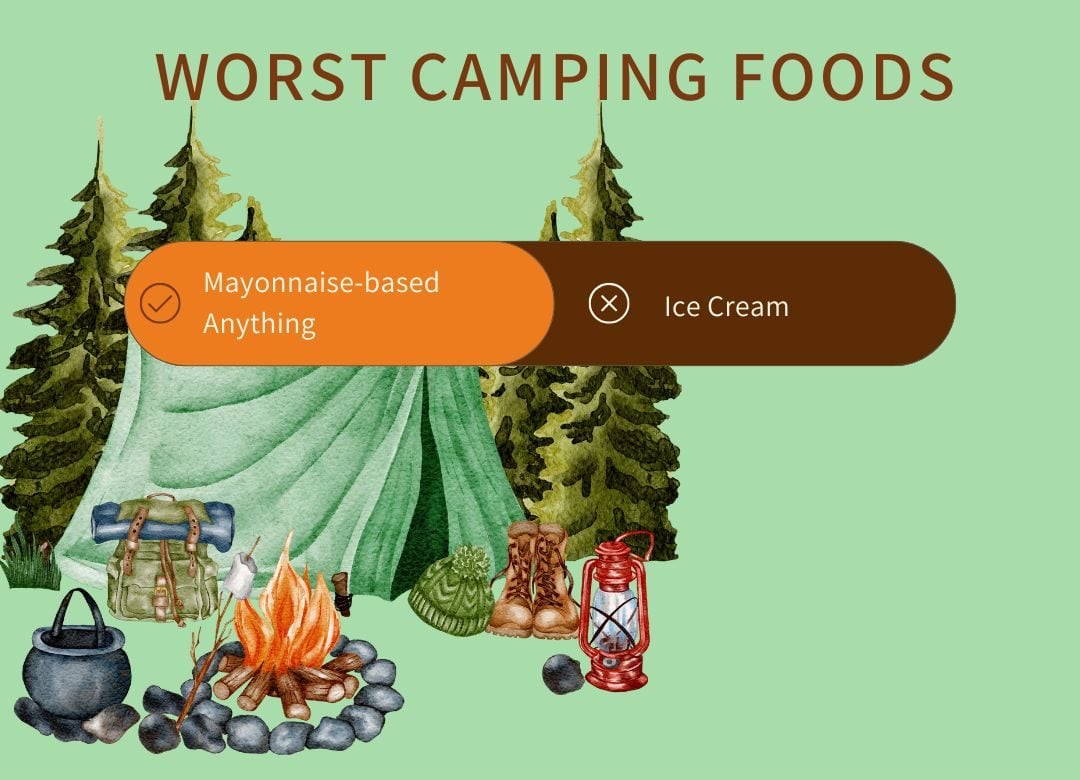
Needless to say, there are a few ingredients that are absolute no-go’s on the trail.
Here are a few additional foods to leave at home when you set off on your camping adventure.
Mayonnaise-based Anything
You may love potato salad on a hot summer’s day, but we recommend you avoid bringing any salad or meal that uses mayonnaise as a binder on your camping excursions.
This is because mayo can get, well, kind of nasty if it’s left out in the heat – and can be a culprit in food poisoning if you’re not too careful. Since it’s hard to monitor temperatures
Ice Cream
We hate to admit it, but it’s true. While it’s tempting to try to pack out a pint of your favorite Ben & Jerry’s, it’s difficult to keep anything frozen for too long on any camping trip.
We recommend you skip bringing your own ice cream, and try to find a local spot to indulge in once you’re done with your outdoor adventure!
Pro Tips for Storing & Packing Food
Want to keep your food fresh, avoid unwanted animal visitors, and make campsite cooking a breeze? Here are some easy tips to help you out:
- Use airtight containers – Lock in freshness and keep critters from sniffing out your snacks. No one wants a raccoon raid in the middle of the night!
- Freeze perishables before you go – Frozen meats, cheese, and other goodies stay cold longer, giving you more time before they spoil.
- Pre-portion & pre-cook meals – Chop, marinate, or even fully cook meals ahead of time. It’ll save you effort at the campsite and cut down on cleanup.
- Bring a solid cooler with ice packs – Keep things chilled with a well-insulated cooler. Block ice lasts longer than cubes, so plan accordingly!
- Leave no trace – Pack out all trash, food scraps, and packaging. Keeping nature clean means we all get to enjoy it longer!
And not to mention that everything is made easier with a great camping cooler.
The Best & Worst Camping Foods to Stay Healthy (and Full)
You can use these recommendations to stay fueled and energized on your next camping trip.
Let us know what you make from these versatile ingredients in the comments below.
As always, no matter what kind of outdoor adventure you’re embarking on, I hope you have the best time out there!


